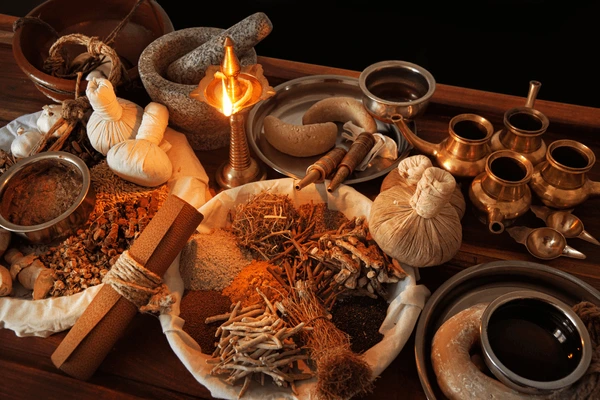
Ayurveda is one of the oldest systems of medicine that addresses a number of diseases; however, it is often surrounded by a number of myths and misconceptions that prevent most from reaping its full benefits. Those misconceptions concern the ability to heal the body the last injury ’it is old fashion’ and so on. In this way, it is quite natural to understand how and why Ayurveda exists in modern times
Is Ayurveda outdated and unscientific?
Ayurveda is a practice that is not an outdated one, it is still practiced in this age. In this respect, different aspects of Ayurveda have entered clinical medicine such as the use of stress reduction techniques which involve taking heat-producing spices like turmeric and ashwagandha.
Furthermore, the attention in modern medicine to healthy nutrition, lifestyle, and mental state, which helps to prevent diseases and support health, also corresponds to Ayurvedic principles. Contrary to traditional home-based practices, Ayurveda is now integrated into clinical-centered holistic medicine. The Ayurvedic system, particularly the Panchakarma method, is increasingly prevalent in rehabilitation medicine, offering significant added value for patient recovery.
Does Ayurveda only include herbal medicines and dietary programs?
Ayurveda certainly includes herbs and diet. Thanks to other methods, such as dinacharya, which refers to regimen activities in daily life, and ritucharya, which entails regimen activities during different seasons of the year, there is no chance of imbalance during the calendar year. When it comes to the mental health aspects, self-care strategies involve meditation, hatha-yoga and pranayama, which are of utmost relevance to Ayurveda practitioners as well.
On top of that, Ayurveda has treatments aimed at cleaning the body and rejuvenating the mind through physiotherapy methods known as Panchakarma. Treatments in Ayurveda are individualized because everyone has his or her own body constitution (dosha) and level of health which affects the treatment offered, thus all the patients do not have the same symptoms.

Can Ayurveda pose any health risks if utilized wrongly?
Yes, anything in Ayurvedic therapy is also harmful if misapplied just like any other method of health treatment. In this case, it is necessary to seek the services of a compotent professional who would provide treatment that creates the greatest benefit for your specific situation.
For example, this type of treatment has some limitations, some ayurvedic herbs can’t be used with Western medicine, or some herbs wouldn’t work in some cases at all. Thus it is vital to look only at a properly qualified Ayurvedic doctor who will be able to understand all the nuances of your constitution (dosha), your current health level, and any diseases you may suffer from if any other conditions are advisable. It is this kind of approach that lessens the chances of any harm being inflicted by too radical forms of Ayurvedic measures to deal with health problems.
Can we call Ayurveda alternative medicine in this present age?
Ayurveda is not a replacement for modern medicine, rather it is an adjunct modality. Although Ayurveda has the knowledge for preventive care, treatment of diseases, care of the patient’s health and other factors, the purpose is not to replace conventional treatment methods, especially in the case of serious or life-threatening illness. On the contrary, Ayurveda can be practiced along with modern medicine and make healthcare more comprehensive.
For instance, stress management, cleansing programmes, and dietary changes offered by Ayurveda can be used effectively along with conventional treatments in order to enhance treatment and improve quality of life. The combination of care offered by Ayurveda and care offered by modern one can be very effective.
Do Ayurvedic treatments take time to see effects?
Ayurvedic approaches may take time, since the emphasis is placed on long-term healing and getting to the bottom of health complaints and not providing quick solutions. It is a systematic approach to restoring the inner and outer harmony of the individual and as such affording a healthier life sustenance.
For instance, chronic imbalances relating to the stomach or stress require the individual to change diet, take herbs, and make other lifestyle changes all aimed at achieving health results within a specific duration. However, this style may require a bit of patience, but results are usually more permanent. A permanent cure is the strength of ayurveda.

Is Ayurveda only for Indians or people of Indian origin?
Ayurveda is a healthcare system that can be applied to anyone, irrespective of a person’s nationality. The principles of homeostasis, living close to nature, and addressing individual needs holds true for everyone and hence, do not lose relevance even in today’s world.
Some of the fundamental tenets of Ayurveda the oneness if the mind, body and spirit, living according to nature, and the tailoring of treatments to the individual are useful to every human being, and so within Ayurveda lies a relevant, working system of health, wherever the place happens to be.
At present day, Ayurveda is well spread and practiced in various countries where there are wellness centers, cruelty-free clinics, and practitioners who provide Ayurvedic treatments. The UNESCO proposes the primary reasons for including Ayurveda in the global health system as the utility and versatility of its principles.
Can anyone practice Ayurveda without formal training?
No, practicing Ayurveda without certain formality is not encouraged. Proper certification entails education and understanding of the context to enhance the effectiveness and safety of Ayurvedic practices.
Ayurveda is more than in due consideration of simply handing over drugs only. It also has a primitive detailing which means that one has to take into consideration every person’s dosha, health status, and environment. Such practitioners with proper training can safely perform and implement the ayurvedic treatment safely, skillfully, and efficiently. In addition, it helps to avoid violations and illegal acts when providing clients with Ayurvedic medication so that the satisfaction of every person who comes for this service is assured.
Wrapping Up!
Firstly, it is impossible to appreciate and completely measure up Ayurveda without first understanding it and busting the common myths associated with it. While Ayurveda may have first risen centuries ago, it is also very much alive today and evolving in a way that coexists with modern medicine. As such understanding and other educational activities aim at changing the negative perception held against Ayurveda more of these benefits will be achieved. This may pertain to use in conjunction with other orthodox therapies, by itself, or in all modalities.
